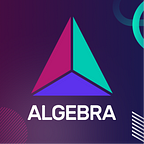Welcome to the second version of the Algebra Protocol. This version includes several major updates & minor fixes aimed at improving the overall functionality and user experience of the code. After making these modifications, the protocol surpasses all existing competitors in its performance and functionality. Let’s see what these innovations bring to the Algebra platform, and review the main points of the brand-new features.
1. Limit Orders
One of the main updates for concentrated liquidity is the addition of the Limit Orders feature, which enables automatic closing of orders at a specific price without the need for an intermediary. This feature is designed to reduce price impact and provide new opportunities for market makers and traders, making the Algebra Protocol even more attractive to aggregators and regular users.
Adding orders with a fixed execution price is a valid continuation of the tick mechanism, and is probably going to be implemented by competing protocols in the future. By simply reducing the price impact, as well as adding new scenarios for market makers and traders, the presence of limit orders at a fixed price can increase the attractiveness of a DEX for basically all market participants.
This way, Limit Orders are the perfect match for the already presented concentrated liquidity and adaptive fees mechanics.
2. Tickspacing Adjustment
A further update is the ability for DEXs to change the tickspacing for pools. This feature improves the performance of stablecoin pairs, as well as allows Algebra’s pools to compete with Uniswap V3 more effectively.
Algebra’s base tickspacing number was 60 by default, but now with this update, the teams of integrated DEXs have the ability to change a pool’s tickspacing however they want. The new implementation doesn’t affect volatile pairs, but will greatly improve stablecoin pairs, as we’ve already mentioned. To implement adjustable tickspacing, the mechanism for storing and moving by ticks has been changed (a doubly linked list instead of a bitmap). Another great news is that this particular update makes swaps slightly cheaper in terms of gas.
3. Rebase Tokens Support
The second version of the Algebra Protocol also includes support for rebase tokens, which, in other words, are elastic supply tokens that have not yet been implemented by any other concentrated liquidity platforms on the market. Algebra is glad to be the pioneer in terms of that implementation.
This change improves support for rebase and similar tokens. The unaccounted excess balance (from both rebase or sending tokens directly to a pool address) is shared among active liquidity providers as a fee. We would also like to mention that this alteration allows you to use flashloans in the pool even with zero liquidity (while it is technically impossible in Uniswap V3). In the old version of our protocol, as well as in Uniswap V3, unaccounted tokens are permanently stuck at the pool address. Gladly, this problem is figured out now with our all-new solution for rebase tokens.
4. Farming Alterations
The new version of Algebra also includes some Farming updates. The key innovation represents getting rid of the need to wrap a liquidity provider’s NFT into another Farming-NFT. As a result, fewer actions will be required from a user, making integrations with third-party protocols (such as Gamma, for example) much more simplified, too.
In addition, the ability to increase or either decrease liquidity without exiting farming and, possibly, changing the position range is added to our protocol, too, widening the possibilities of our users.
5. Minor Changes
As the ground for the second generation of the Algebra Protocol, modified versions of smart contracts have been created. The update itself includes a number of minor improvements proposed during the contest audit in terms of improving security and optimizing the code itself. In-depth code optimization has been done, along with minor changes aimed at simplifying the support and use of a DEX, using our tech. It applies to the following:
- smart contracts optimization
- simplification of community fee settings, including the update of the adaptive commission settings
- reduction of flashloan fees to increase the attractiveness of Algebra-provided technology for users
New version: https://github.com/cryptoalgebra/Algebra/tree/dev
New lines: ~ 2500
Conclusion
In summary, you can see that the Algebra Protocol’s second update includes both major and minor fixes aimed at improving the overall functionality and altering the user experience, making our platform even more reliable and easy to integrate. The addition of limit orders and support for rebase tokens are significant updates that set the Algebra Protocol apart from other concentrated liquidity protocols and DEXs across all DeFi.
The ability to change tickspacing for pools, security & smart contract optimization improvements, as well as farming changes are also noteworthy updates that will make the platform more competitive.
About Algebra
Algebra is a breakthrough AMM, and a concentrated liquidity protocol for decentralized exchanges, running on adaptive fees. Providing projects with more user-friendly, fresh solutions and implementing the most efficient technologies, it reforms the DeFi field as we know it.
